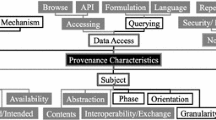Abstract
Provenance is defined in some literature as a complete documentation of process that led to an object. Provenance has been utilized in some contexts, i.e. database systems, file systems and grid systems. Provenance can be represented by a directed acyclic graph (DAG). In this paper we show an access control method to the provenance information that is represented by a directed acyclic graph and a method to improve efficiency of access control by grouping the provenance information. The idea of our model is that by controlling access to nodes, edges and paths in the provenance graph we may build an expressive access control model to the provenance graph. We improve the efficiency of access control model by grouping some provenance information. In our model, the provenance information is stored in a relational database. Before explaining our idea, we describe provenance store, provenance representation, and how to store provenance graph in a relational database.
Preview
Unable to display preview. Download preview PDF.
Similar content being viewed by others
References
Bowers, S., McPhillips, T.M., Ludascher, B., Cohen, S., Davidson, S.B.: A Model for User-Oriented Data Provenance in Pipelined Scientific Workflows. In: Moreau, L., Foster, I. (eds.) IPAW 2006. LNCS, vol. 4145, pp. 133–147. Springer, Heidelberg (2006)
Braun, U., Shinnar, A., Seltzer, M.: Securing Provenance. In: Proceedings of the 3rd USENIX Workshop on Hot Topics in Security (HotSec), San Jose, CA (July 2008)
Chebotko, A., Chang, S., Lu, S., Fotouhi, F., Yang, P.: Secure Scientific Workflow Provenance Querying with Security Views. In: 9th International Conference on Web-Age Information Management (WAIM), pp. 349–356. IEEE press, Los Alamitos (2008)
Chen, L., Tan, V., Xu, F., Biller, A., Groth, P., Miles, S., Ibbotson, J., Luck, M., Moreau, L.: A Proof of Concept: Provenance in a Service Oriented Architecture. In: Proceedings of the Fourth All Hands Meeting (AHM) (September 2005)
Groth, P., Jiang, S., Miles, S., Munroe, S., Tan, V., Tsasakou, S., Moreau, L.: An Architecture for Provenance Systems — Executive Summary. Technical report, University of Southampton (February 2006)
Groth, P., Jiang, S., Miles, S., Munroe, S., Tan, V., Tsasakou, S., Moreau, L.: An Architecture for Provenance Systems. Technical report, University of Southampton (November 2006)
Groth, P., Miles, S., Moreau, L.: PReServ: Provenance Recording for Services. In: UK e-Science All Hands Meeting 2005, Nottingham, UK (September 2005)
Moreau, L., Freire, J., Futrelle, J., McGrath, R.E., Myers, J., Paulson, P.: The Open Provenance Model: An Overview. In: Second International Provenance and Annotation Workshop, IPAW 2008, Salt Lake City, UT, USA, June 17-18 (2008)
Nagappan, M., Vouk, M.A.: A Model for Sharing of Confidential Provenance Information in a Query Based System. In: Second International Provenance and Annotation Workshop, IPAW 2008, Salt Lake City, UT, USA, June 17-18 (2008)
Simmhan, Y.L., Plale, B., Gannon, D.: A Framework for Collecting Provenance in Data-Centric Scientific Workflows. In: Proceedings of the IEEE International Conference on Web Services, September 18-22, 2006, pp. 427–436 (2006)
Tan, V., Groth, P.T., Miles, S., Jiang, S., Munroe, S., Tsasakou, S., Moreau, L.: Security Issues in a SOA-Based Provenance System. In: Moreau, L., Foster, I. (eds.) IPAW 2006. LNCS, vol. 4145, pp. 203–211. Springer, Heidelberg (2006)
Author information
Authors and Affiliations
Editor information
Editors and Affiliations
Rights and permissions
Copyright information
© 2009 Springer-Verlag Berlin Heidelberg
About this paper
Cite this paper
Syalim, A., Hori, Y., Sakurai, K. (2009). Grouping Provenance Information to Improve Efficiency of Access Control. In: Park, J.H., Chen, HH., Atiquzzaman, M., Lee, C., Kim, Th., Yeo, SS. (eds) Advances in Information Security and Assurance. ISA 2009. Lecture Notes in Computer Science, vol 5576. Springer, Berlin, Heidelberg. https://doi.org/10.1007/978-3-642-02617-1_6
Download citation
DOI: https://doi.org/10.1007/978-3-642-02617-1_6
Publisher Name: Springer, Berlin, Heidelberg
Print ISBN: 978-3-642-02616-4
Online ISBN: 978-3-642-02617-1
eBook Packages: Computer ScienceComputer Science (R0)




